More than 2000 Rohingya have been held captive in detention centres and refuges in Thailand since January in conditions that a secret film has revealed to be inhumane.
Troubling reports that Phuketwan is seeking to confirm indicate that the treatment of the Rohingya in Thailand is becoming more brutal and unacceptable as a six-month deadline for a decision on their future looms close.
Late last week a resolution adopted by the European Parliament called on Thailand ''to end immediately the inhumane detention of . . . Rohingya asylum seekers and to provide them with access to UN refugee agencies.''
The resolution went on to express regret that Thailand ''has so far failed to permit the UNHCR to conduct refugee status determination screenings of Rohingya asylum seekers.''
The message to Thailand was part of a broader resolution aimed at ending Burma's repression and ethnic cleansing of Rohingya in Rakhine state.
Human Right Watch supported the call today with Phil Robertson, Deputy Director, Asia Division, adding: ''By calling out Thailand on its inhumane detention of Rohingya asylum seekers in immigration detention facilities like those in Phang Nga, the European Parliament is firing a clear warning shot across Bangkok's bow.''
Secret television footage taken inside the Phang Nga detention centre, north of Phuket, has portrayed overcrowding in cells, with 276 men limited in movements and with their muscles beginning to atrophy.
The necessity for the Muslim men to fast daily during Ramadan from July 9 could bring deaths in custody among those already weakened by their brutal treatment.
''The government's policy of punitive detention of Rohingya is unacceptable, and Thailand needs to immediately change course, release the Rohingya, permit reunification of families split apart by the government's policy, and allow the Rohingya unhindered access to UNHCR to make refugee claims if that is what they want to do,'' Mr Robertson told Phuketwan.
Reliable sources say that even tighter restrictions on access to the Rohingya are now in place following the screening of the television footage taken in secret inside Phang Nga detention centre by Britain's Channel 4.
Sources say conditions in at least one other detention centre are worse than those in Phang Nga. A smaller group of men is believed to be in detention at Phuket Immigration HQ in Phuket City.
Thailand appears to be trying to decide what to do with its captive Rohingya before a self-imposed six-month deadline strikes midnight within weeks.
Repatriation - which the Rohingya would not accept - or continuing their captivity in a purpose-built refugee camp are two options.
The Rohingya are known to be disheartened and becoming increasingly depressed because they had hoped to proceed as thousands of others have done through Thailand to Malaysia in just a few days.
''Everyone recognises that that the root of this crisis lies in the horrific abuses meted out by the Burmese government and its security forces against the Rohingya in Arakan state,'' Mr Robertson said.
''For its own interest in slowing the flow of boat people fleeing the country, and because it's the right thing to do, the Thai government should be working with other frontline Asean states like Indonesia, Malaysia and Brunei to demand that the Burmese government recognise Rohingya as their citizens and end the campaign of ethnic cleansing against them.''
WHERE boatpeople are kept in inhumane conditions
http://blogs.channel4.com/world-news-blog/the-plight-of-burmas-rohingya-muslims-in-a-thai-camp/24226/
The European Parliament,
..having regard to its previous resolutions on Burma/Myanmar, in particular those of 20 April 2012[1], 13 September 2012[2] and 22 November 2012[3],
..having regard to its resolution of 23 May 2013 on reinstatement of Myanmar/Burma's access to generalised tariff preferences[4],
..having regard to the EU Foreign Affairs Council conclusions of 22 April 2013 on Myanmar/Burma,
..having regard to the statement by High Representative Catherine Ashton of 27 November 2012 on the 2012 United Nations General Assembly (UNGA) resolution on the situation of human rights in Myanmar,
..having regard to the statement by the spokesperson of High Representative Catherine Ashton of 1 June 2013 on the agreement concluded between the Government of Myanmar/Burma and the Kachin Independence Organisation,
..having regard to the statement of EU Commissioner for International Cooperation, Humanitarian Aid and Crisis Response, Kristalina Georgieva, of 9 August 2012 on the situation of Rohingya Muslims,
..having regard to the final report of the Delegation of its Subcommittee on Human Rights to Burma/Myanmar from 3 to 5 April 2013,
..having regard to the European Union's set of restrictive measures, as set out in Council Decision 2010/232/CFSP of 26 April 2010 and as most recently amended by Council Regulation (EU) No 1083/2011 of 27 October 2011,
..having regard to the statement by the spokesperson of High Representative Catherine Ashton of 23 March 2013 on the violent clashes in the town of Meiktila in Burma/Myanmar,
..having regard to the statement by the spokesperson of the High Representative Catherine Ashton of 2 April 2013 on the reported death of 13 children caused by a fire in a Muslim school in Burma,
..having regard to the Universal Declaration of Human Rights of 10 December 1948,
..having regard to the International Covenant on Civil and Political Rights (ICCPR) of 1966,
..having regard to the 1951 UN Convention on the Status of Refugees and the 1967 Protocol thereto,
..having regard to UNGA Resolution 67/233 of 24 December 2012 on the situation of human rights in Myanmar,
..having regard to the UNHCR call of 13 November 2012 upon governments in Southeast Asia to keep their borders open to people fleeing Burma by sea,
..having regard to the report of the United Nations Special Rapporteur of 6 March 2013 on the situation of human rights in Burma/Myanmar, as well as his statement of 11 June 2013 that ''the human rights violations being committed against Rohingya in Rakhine State are widespread and systematic'',
..having regard to the statement by Aun San Suu Kyi of 27 May 2013 about the ''two-child policy'' for Rohingya Muslims,
..having regard to the decision taken at the ASEAN summit in November 2011 to confer the ASEAN presidency on Burma/Myanmar in 2014,
..having regard to the Human Rights Watch report '''All You Can Do is Pray'': Crimes Against Humanity and Ethnic Cleansing of Rohingya Muslims in Burma's Rakhine State' of 22 April 2013,
..having regard to Rules 122(5) and 110(4) of its Rules of Procedure,
A. whereas the persecution of, and violence against, the Rohingya minority continue to intensify, most notably through the destruction of property and places of worship, mass arrests, arbitrary imprisonment, torture, rape, and restrictions on freedom of movement, marriage rights and access to education;
B. whereas the religious violence that started in Rakhine State has continued to spread throughout the country; whereas in the period between March and May 2013 several anti-Muslim attacks were reported in Rangoon Division, Mandalay and Pegu, as well as in Kachin and Shan states, resulting in 46 deaths and the displacement of over 14,000 people;
C. whereas sectarian violence has now spread to a new area in Burma, as shops in the Shan State town of Lashio were burned by a mob on 28 May 2013 and three Rohingya women were killed by police in the village of Parein during a clash over housing for the displaced minority on 4 June 2013;
D. whereas over 130 000 displaced Rohingyas remain in camps and other areas, and the Government of Burma/Myanmar has allowed only limited and inadequate humanitarian access to Rohingya populations at risk; whereas many Rohingyas are confined to flood-prone areas where they are exposed to monsoon rains and cyclones; whereas they are unable to return to their homes because of continued violence or because their homes have been destroyed or they are prevented by security forces from leaving the camps where they are being held;
E. whereas tens of thousands of Rohingyas have fled by sea to escape persecution, and whereas hundreds have lost their lives in sinking boats or by being pushed back into the sea; whereas close to 1700 Rohingyas [actually more than 2000 on official figures] fleeing Burma are reported to be held in horrendous conditions in Thai immigration detention centres;
F. whereas on 23 April 2013 the Independent Commission of Inquiry, set up in August 2012 in order to investigate sectarian violence in Rakhine state, issued a report with recommendations intended to ease tensions, but has nevertheless refused to acknowledge Rohingya identity, failed to hold anyone accountable for human rights abuses committed during the unrest, favoured a ''temporary separation'' of the Muslim and Buddhist communities, and recommended the implementation of unacceptable birth-control programmes for Muslims;
G. whereas although Burmese President U Thein Sein pledged in a speech on 6 May 2013 that his government would ensure the basic rights of Muslims in Rakhine state, and although he has taken some steps to expand civil liberties in the country, the dramatic situation of the Rohingyas, and of inter-ethnic relations overall, has the potential to undermine the entire reform process in Burma/Myanmar; whereas credible independent reports point to the complicity of the Burmese authorities in crimes against humanity targeting the Rohingya population that have resulted in Rakhine state largely being segregated along religious lines;
H. whereas the Government of Burma/Myanmar has recently announced that it will reinstate a two-child policy; whereas this has been condemned by the UN Special Rapporteur on Human Rights in Burma/Myanmar, Tomas Ojea Quintana, as a discriminatory and coercive measure against Rohingyas in Rakhine state that violates the basic human rights of the Rohingya, as well as Burma's international human rights obligations and commitments;
I. whereas the international community has urged the Burmese Government to review its 1982 Citizenship Law to ensure that the Rohingya are no longer stateless and that the roots of longstanding discrimination against the Rohingya population are dealt with;
J. whereas Dr Tun Aung, a 65-year-old medical doctor and respected community leader from Rakhine state, was arrested in June 2012 and sentenced to 17 years in prison on what have widely been denounced by human rights groups, including Amnesty International, as politically motivated charges;
K. whereas according to the Human Rights Watch report '''All You Can Do is Pray'': Crimes against Humanity and Ethnic cleansing of Rohingya Muslims in Burma's Rakhine State', released on 22 April 2013, the abuses perpetrated against the Rohingyas last year, which allegedly involved state agencies, amounted to crimes against humanity and ethnic cleansing; whereas this report also presents evidence of four mass-grave sites dating from 2012 in Rakhine state;
L. whereas freedom of the press and media, both online and offline, plays a crucial role in uncovering and documenting human rights abuses and holding governments accountable;
M. whereas under the Universal Declaration of Human Rights, everyone has the right to seek asylum from persecution;
1. Condemns the grave violations of human rights and the violence perpetrated against Rohingya Muslims in Burma/Myanmar and calls on all sides to refrain from the use of violence;
2. Expresses its condolences to the victims of violence and unlawful persecution in Burma/Myanmar;
3. Recognises the steps taken by President U Thein Sein and other reformers in Burma/Myanmar to introduce democratic reforms over the past year; deplores, however, the failure of the government to protect the Rohingya from organised violence, and calls on the government and all of Burmese/Myanmar society to act immediately to end the human rights abuses and bring the perpetrators of the violent attacks and other related abuses to justice;
4. Urges the Government of Burma/Myanmar to ensure that its security forces do everything in their power to protect Rohingya Muslims from violent actions; expresses its deep concerns over allegations that members of Burmese security forces have participated in the violence, and repeats its urgent calls for a full and independent investigation, with the help of the United Nations, into these allegations;
5. Stresses the need for urgent action to deal with the humanitarian risks facing all displaced persons, and in particular the Rohingya people, in Burma/Myanmar; reiterates its call on the Government of Burma/Myanmar to provide UN agencies and humanitarian NGOs, as well as journalists and diplomats, with unhindered access to all areas of the country, including Rakhine state, and to give unrestricted and full access to humanitarian aid for all communities affected by conflict and sectarian violence; calls on the Burmese authorities to improve conditions in the Rohingya displacement camps as a matter of urgency;
6. Urges all countries in the region to uphold their international obligations as regards the rights of refugees, to open borders to Rohingya asylum seekers and to provide them at least with temporary protection, whilst supporting the Burmese Government in finding long-term, equitable solutions to the underlying causes;
7. Calls on the Government of Thailand to end immediately the inhumane detention of at least 1700 Rohingya asylum seekers [actually 2000-plus] and to provide them with access to UN refugee agencies; regrets the fact that the Government of Thailand has so far failed to permit the UNHCR to conduct refugee status determination screenings of Rohingya asylum seekers;
8. Urges the Burmese Government to authorise the establishment of an OHCHR office in the country, with branch offices in the provinces, in order to allow for adequate monitoring of the human rights situation in the country;
9. Welcomes the promise of President U Thein Sein that all perpetrators of violence will be prosecuted, as well as his commitment to a multicultural, multi-ethnic and multi-faith society; calls on the President to take further action to enforce the rule of law and to address the root causes of violence;
10. Welcomes the announcement by President U Thein Sein on 4 June 2013 that all political prisoners in Burma/Myanmar will be released; reiterates its position that the release of all political prisoners, including Dr Tun Aung, should take place without delay or conditions and with the full restoration of their rights and freedoms;
11. Urges the government to continue to pursue and implement durable solutions to the underlying causes of the tensions, including measures addressing the status of the Rohingya; reiterates its earlier calls for an amendment or repeal of the 1982 Citizenship Law in order that Rohingyas have equal access to Burmese citizenship, implying both rights and duties, and to bring the amended or replaced law into line with international human rights standards and with the country.s obligations under Article 7 of the UN Convention of the Rights of the Child;
12. Criticises the statement of the Burmese Immigration Minister Khin Yi of 11 June 2013 in which he expressed his support for the reinstatement of the two-child policy;
13. Welcomes the recent declaration by opposition leader Aung San Suu Kyi in protest of the reintroduction of the two-child policy for Rohingyas, and urges the Burmese Government to revoke immediately this regulation along with other coercive or discriminatory policies, rules, regulations or laws;
14. Underline the importance of making the legislative and administrative changes necessary to ensure the fullest participation of the Burmese population, including minorities, in the 2014 elections;
15. Calls on the Vice-President / High Representative to address this issue at the highest possible political level in her contacts with Burma/Myanmar and with other ASEAN member countries;
16. Recalls that the European Union has recently reinstalled its Generalised System of Preferences (GSP) vis-a-vis Burma/Myanmar; reiterates the conditionality of these preferences as regards respect for fundamental freedoms and human rights; urges the Commission to monitor closely the progress made by the Burmese authorities in respecting these conditions;
17. Asks the Commission, when submitting to Parliament and the Council a delegated act for the continued application of the GSP system to Burma/Myanmar after 31 December 2013, to include an accompanying report demonstrating the absence of serious and systematic violations of the principles laid down in the conventions listed in the GSP regulation, with particular focus on the Rohingya;
18. Calls on the Commission to assess in an effective and comprehensive manner the human rights impact of the envisaged bilateral investment agreement before formulating its proposal for negotiating directives, and in this process closely to consult Parliament and civil society;
19. Expects the EEAS to consult and inform Parliament regularly on the process of establishing a human rights dialogue with Burma/Myanmar; asks the EEAS and the Member States to set a list of precise human rights benchmarks against which to assess reform progress by the Burmese authorities; underlines the fact that further development of EU relations with the Burmese leadership should be conditional on tangible progress, notably with regard to the Rohingya situation;
20. Calls for a strong and visible civil society component, in which the Rohingya are represented, to participate in the EU-Burma Task Force to be established later this year, and for this effort to build on the experience of the EU-Egypt Task Force;
21. Instructs its President to forward this resolution to the Council, the Commission, the Vice-President of the Commission / High Representative of the Union for Foreign Affairs and Security Policy, the governments and parliaments of the Member States, the Government and Parliament of Burma/Myanmar, the Secretary-General of ASEAN, the ASEAN Intergovernmental Commission on Human Rights, the UN Special Representative for Human Rights in Myanmar, the UN High Commissioner for Refugees, the UN Human Rights Council and the governments and parliaments of other states in the region.

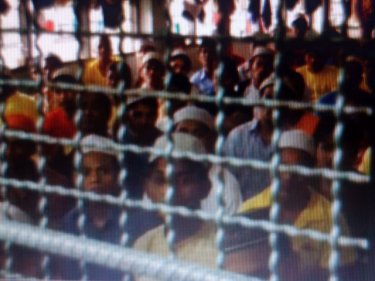

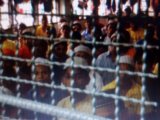
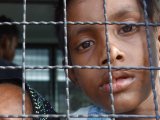
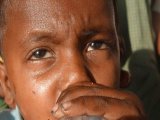
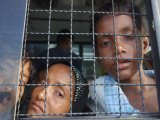
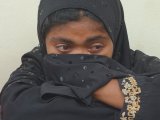
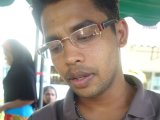
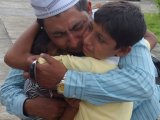

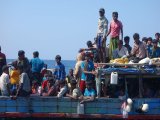

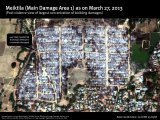
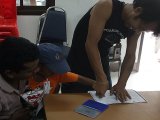



Excellent reporting.
I hope and pray that the European Parliament their influence will create better conditions for the Royingha as we all see what the selfish and neglective (local) governments tend to do....which is either ignoring the problem or using these refugees for their own benefits....
Posted by Richard on June 17, 2013 20:17